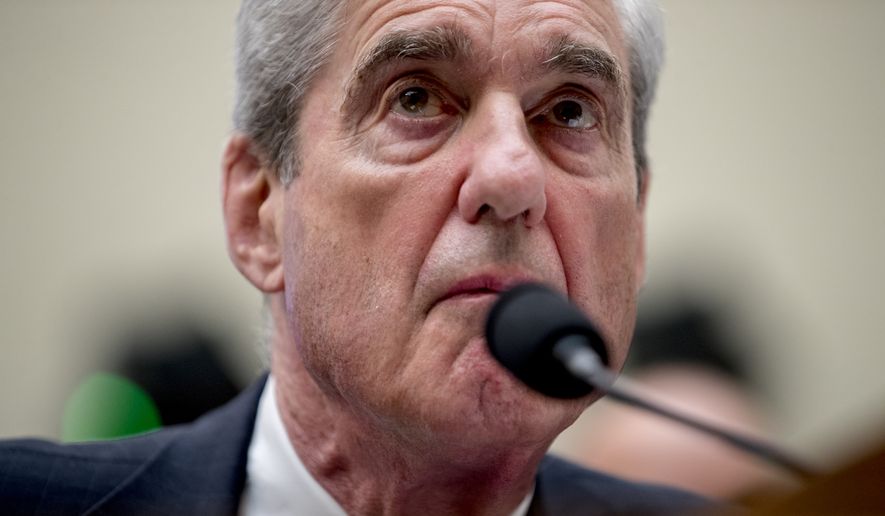Former special counsel Robert Mueller’s testimony did not move the needle on impeachment, with Americans telling pollsters they are as opposed as ever to the idea.
Yet that’s not because they didn’t agree with Mr. Mueller’s conclusions.
Most voters in the latest Quinnipiac University National Poll say Mr. Mueller didn’t exonerate Mr. Trump and agree with Democratic complaints that the president did attempt to obstruct the Russia investigation — and said he’s a racist, too.
But voters don’t buy Democrats’ conclusion that Mr. Trump’s behavior is worthy of impeachment.
Some 60% said they don’t support beginning the process to impeach the president — a number that’s held fairly steady for months in Quinnipiac’s surveys. Men and women, the college-educated and those without degrees, and voters of all age brackets reject impeachment.
That tracks the findings of other polls taken in the week since Mr. Mueller’s testimony, which Democrats had hoped would create a groundswell of support for impeachment.
“When it comes to the Mueller hearings, minds were not changed on impeachment or that President Trump was cleared of wrongdoing,” said Mary Snow, polling analyst at Quinnipiac.
Mr. Mueller delivered Democrats the sound bite they wanted when he told House intelligence committee Chairman Adam Schiff that the Trump campaign welcomed Russian interference and then lied to cover it up. But he also stumbled over his testimony, seemed unfamiliar with his 448-page report and specifically declined to back impeachment, calling that a matter for Congress to decide.
The consensus among the television punditry who had devoted blanket coverage to the testimony was that the push for impeachment was over. If so, someone forgot to tell the Democrats.
In the week since the testimony, the number of House lawmakers saying they want to begin proceedings has grown steadily, and now totals more than 110. Rep. Jennifer Wexton, a freshman from Northern Virginia, added her voice to the list Tuesday, saying after watching Mr. Mueller’s testimony she concluded Mr. Trump could be charged with crimes.
“I cannot sit idly by while the pillars of our democracy are chipped away,” she said.
Need to Impeach, a group founded by Democratic presidential candidate Tom Steyer, announced Tuesday it was running ads highlighting the exchange with Mr. Schiff, hoping to stoke interest in ousting Mr. Trump.
The ad will run surrounding Democrats’ presidential debates being aired on CNN this week.
Matt McDermott, a Democratic pollster and director at Whitman Insight Strategies, said party leaders are to blame for the disconnect between voters’ attitude toward Mr. Trump’s behavior — decidedly negative — and the lack of demand for consequences.
“Democrats have made a strong case for how Trump has obstructed justice. They’ve made a strong case for why Mueller’s testimony suggests Trump is a liar. They’ve made a strong case for why he’s a racist. They’ve failed so far to make a strong case for why Trump should be impeached,” Mr. McDermott said.
He said it’s not surprising that voters, including some Democrats, are hesitant to embrace impeachment when major voices such as House Speaker Nancy Pelosi have yet to embrace even opening an inquiry.
If anything, Mr. McDermott said, he’s surprised impeachment support is as high as it is, given those headwinds.
“Voters tend to follow their leaders on issues like these — and I think it’s safe to expect support for impeachment to grow among Democrats and independents if House leaders were to change their tune and make a credible case for impeachment to the American people,” he told The Times.
But Jim McLaughlin, a Republican pollster who has done work for Mr. Trump, said he sees the public giving a collective shrug.
“In focus groups, I constantly hear voters say ’enough with Russia, enough with impeachment, it is time to move on,’” he said. “Nancy Pelosi gets it — it is why she doesn’t want to impeach. And basically the Mueller hearing totally discredited the Mueller report and, unless you are a Dem partisan or in the mainstream media, Americans want to move forward.”
Mr. McLaughlin also questioned Quinnipiac’s methods, pointing to the pollster’s botched predictions ahead of last year’s elections.
“They get too many non-voters in their samples,” he said.
In the latest poll, he said 30% of respondents to Quinnipiac were identified as Republicans. But the national electorate hasn’t been lower than 33% GOP since the 1980s. The only demographics where Quinnipiac showed majority support for beginning impeachment were black voters and self-identified Democrats.
Another survey, the Emerson Poll, highlighted Democrats’ dilemma.
Impeachment is now the most important issue to Democratic presidential primary voters, with nearly 19% placing it at the top of their list, ahead of health care and the economy.
“The Democrats are taking a gamble with an increased emphasis on impeachment proceedings following the Mueller hearings,” said Spencer Kimball, Emerson’s polling director.
Michael McKenna, a Republican strategist, said interest in impeachment has peaked.
“Most voters don’t really care about inside-Washington baseball, and impeachment talk is getting to be the most inside and most Washington of all baseball,” he said. “If the Democrats in the House impeach the president, it won’t change a thing in most people’s lives. Voters know that.”
The problem for those Democrats, though, is that they don’t have much else to show for their new majority. What liberal agenda items have cleared the House have no chance of earning a vote in the Senate, where the GOP still holds a majority.
“They are left to do the only thing they can do — throw some red meat (impeachment) to the leftward-most folks in their party. If you can’t make policy, or even talk about it, you’re left with the thin gruel of retribution,” Mr. McKenna said.
⦁ David Sherfinski contributed to this article.
• Stephen Dinan can be reached at sdinan@washingtontimes.com.
• Gabriella Muñoz can be reached at gmunoz@washingtontimes.com.




Please read our comment policy before commenting.